A is correct
You need to create a flow for moving data from the Sales Log to the Job Setup entity.
Which type of flow should you use?
D
Explanation:
Scenario: Automatically perform the following actions immediately when a sale is won:
Generate a sequential job number.
Copy key sales information to the Job Setup entity used by manufacturing.
Note: This question is part of a series of questions that present the same scenario. Each question in the series contains a
unique solution that might meet the stated goals. Some question sets might have more than one correct solution, while
others might not have a correct solution.
After you answer a question in this section, you will NOT be able to return to it. As a result, these questions will not appear in
the review screen.
You are developing a model-driven app that uses a Common Data Service database. App users will have a variety of
different security roles.
Development and testing must be performed using production data. Multiple testers must be used at each testing stage.
You need to provision and configure new environments for development and testing.
Solution:
Provision a developer environment named D1 and a sandbox environment named S1.
Copy the production environment to both D1 and S1. Use D1 for development and S1 for testing.
Does the solution meet the goal?
B
Explanation:
Production: This is intended to be used for permanent work in an organization.
Do not use production environment for testing.
Note: Instead use two sandboxed environments: one for development and one for testing.
Reference: https://docs.microsoft.com/en-us/power-platform/admin/environments-overview
A is correct
You have a Power Apps solution that includes three model-driven apps, a business process flow, and a scheduled flow. The
solution is deployed to a datacentre in the United States.
You plan to deploy the solution to Canada.
You need to identify applicable government regulations for all components of the solution.
Which three actions should you perform? Each correct answer presents part of the solution.
NOTE: Each correct selection is worth one point.
A D E
Explanation:
A: The Microsoft Service Trust Portal provides a variety of content, tools, and other resources about Microsoft security,
privacy, and compliance practices.
D: The Service Trust Portal contains details about Microsoft's implementation of controls and processes that protect our
cloud services and the customer data therein.
Reference:
https://docs.microsoft.com/en-us/microsoft-365/compliance/get-started-with-service-trust-portal
A company uses Microsoft platforms for all accessibility, compliance, and security auditing.
The auditing and compliance division of the company flags a newly created Power Apps canvas app due to accessibility
issues. The app must be unpublished until it conforms to Microsoft accessibility requirements and recommendations.
You need to identify all accessibility issues for a solution.
What should you use?
C
Explanation:
Find accessibility issues
In the upper-right corner of Power Apps Studio, select the icon for the App checker.
App checker icon.
In the menu that appears, select Accessibility.
A list of issues appears, sorted first by severity and then by screen.
Select the arrow next to an item to show details about it.
Accessibility checker details.
Select the back arrow to return to the list of items.
If you decide to address an issue, select it to open the affected property.
After you change one or more properties, select Re-check to update the list of issues.
Resolved items disappear from the list, and new items may appear.
Incorrect Answers:
A: Microsoft publishes conformance reports that describe how our products map to accessibility requirements, such as
Section 508, WCAG 2.0, and EN 301 549.
B: The Office 365 Security & Compliance Center is designed to help organizations manage compliance across Office 365
including protecting data and complying with legal and regulatory standards.
Reference: https://docs.microsoft.com/en-us/powerapps/maker/canvas-apps/accessibility-checker
https://support.microsoft.com/en-us/accessibility/enterprise-answer-desk
You are using Test Studio to test a Power Apps canvas app.
You need to ensure that the app conforms to several use cases.
What should you do first?
D
Explanation:
Create a test suite.
By default, a test suite and test case are created for you in Test Studio. Test suites are used to organize your test cases.
Reference: https://docs.microsoft.com/en-us/powerapps/maker/canvas-apps/working-with-test-studio
A company is onboarding new workers to the Microsoft Power Platform.
A user reports an access issue with a Power Apps app. The user provides no additional information about the access issue.
You need to troubleshoot the app and data security configurations for the user.
Which tool should you use?
D
Explanation:
User access diagnostic tool in the Power Platform admin center:
Several factors influence user access in a Microsoft Dataverse environment. To help administrators with diagnosing user
access to an environment and reasons for access or no access, the new Run diagnostics feature in the Power Platform
admin center provides basic access diagnostics for individual users in the environment. The feature helps to detect potential
causes to user sign-in and other issues and suggests potential mitigations.
Reference:
https://docs.microsoft.com/en-us/power-platform/admin/troubleshooting-user-needs-read-write-access-organization
You have a Power Platform solution that uses Common Data Service.
You need to secure all fields that support field-level security.
Which field can you secure?
D
Explanation:
Which fields can be secured?
Although most attributes can be secured, there are system attributes, such as IDs, timestamps, and record tracking
attributes, that can't. Below are a few examples of attributes that can't be enabled for field security.
ownerid, processid, stageid, accountid, contactid createdby, modifiedby, OwningTeam, OwningUser
createdon, EntityImage_Timestamp, modifiedon, OnHoldTime, overriddencreatedon statecode, statuscode
Note:
There are several versions of this question in the exam. The question has two possible correct answers:
1. cr7b_accountid
2. description
Other incorrect answer options you may see on the exam include the following: statecode modifiedby
Reference:
https://docs.microsoft.com/en-us/power-platform/admin/field-level-security
Note: This question is part of a series of questions that present the same scenario. Each question in the series contains a
unique solution that might meet the stated goals. Some question sets might have more than one correct solution, while
others might not have a correct solution.
After you answer a question in this section, you will NOT be able to return to it. As a result, these questions will not appear in
the review screen.
You are developing a model-driven app that uses a Common Data Service database. App users will have a variety of
different security roles.
Development and testing must be performed using production data. Multiple testers must be used at each testing stage.
You need to provision and configure new environments for development and testing.
Solution:
Provision production environments named P1 and P2.
Copy the current production environment to P1 and P2. Use P1 for development and P2 for testing.
Does the solution meet the goal?
B
Explanation:
Production: This is intended to be used for permanent work in an organization.
Don't use production environment for development and testing.
Reference: https://docs.microsoft.com/en-us/power-platform/admin/environments-overview
A is correct answer
Note: This question is part of a series of questions that present the same scenario. Each question in the series contains a
unique solution that might meet the stated goals. Some question sets might have more than one correct solution, while
others might not have a correct solution.
After you answer a question in this section, you will NOT be able to return to it. As a result, these questions will not appear in
the review screen.
You are developing a model-driven app that uses a Common Data Service database. App users will have a variety of
different security roles.
Development and testing must be performed using production data. Multiple testers must be used at each testing stage.
You need to provision and configure new environments for development and testing.
Solution:
Provision a trial environment named T1 and a sandbox environment named S1.
Copy the production environment to T1 and S1. Use T1 for development and S1 for testing.
Does the solution meet the goal?
B
Explanation:
Using trial environments, companies and customers can try out new features and solutions. Do not use a trial environment
for development.
A sandbox environment is any non-production environment of Microsoft Dataverse. Isolated from production, a sandbox
environment is the place to safely develop and test application changes with low risk.
Reference: https://docs.microsoft.com/en-us/power-platform/admin/trial-environments https://docs.microsoft.com/en-
us/power-platform/admin/sandbox-environments
Note: This question is part of a series of questions that present the same scenario. Each question in the series contains a
unique solution that might meet the stated goals. Some question sets might have more than one correct solution, while
others might not have a correct solution.
After you answer a question in this section, you will NOT be able to return to it. As a result, these questions will not appear in
the review screen.
You are developing a model-driven app that uses a Common Data Service database. App users will have a variety of
different security roles.
Development and testing must be performed using production data. Multiple testers must be used at each testing stage.
You need to provision and configure new environments for development and testing.
Solution:
Provision sandbox environments named S1 and S2.
Copy the production environment to both S1 and S2. Use S1 for development and S2 for testing.
Does the solution meet the goal?
A
Explanation:
A sandbox environment is any non-production environment of Microsoft Dataverse. Isolated from production, a sandbox
environment is the place to safely develop and test application changes with low risk.
Reference: https://docs.microsoft.com/en-us/power-platform/admin/environments-overview
HOTSPOT
A production line app maker at a manufacturing company creates a canvas app that looks for available inventory in a SQL
database. The production line workers use the inventory app across all work centers.
The production line workers report the following app issues from the shop floor:
The app reports a delegation warning.
Voice command functionality is unreliable.
You have minimal information about the issues. You are not allowed to enter the production facility.
You need to troubleshoot the issues.
How should you troubleshoot the issues? To answer, select the appropriate options in the answer area.
Hot Area: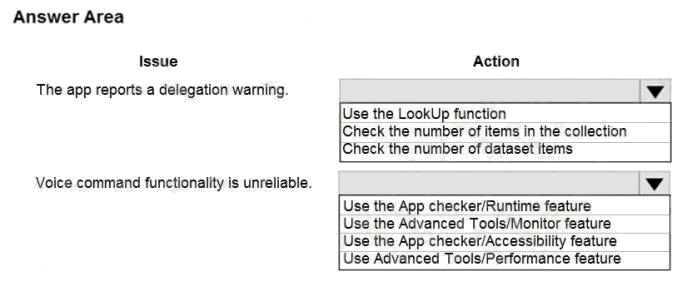
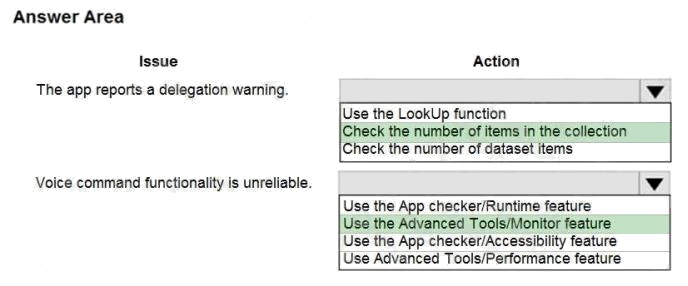
Explanation:
Box 1: Check the number of items in the collection
If the data in your data source exceeds 500 records and a function can't be delegated, Power Apps might not be able to
retrieve all of the data, and your app may have wrong results.
Note: Delegation is where the expressiveness of Power Apps formulas meets the need to minimize data moving over the
network. In short, Power Apps will delegate the processing of data to the data source, rather than moving the data to the app
for processing locally.
Box 2: Use the Advanced Tools/Monitor feature
Monitor is available by default for all canvas apps. Using Monitor, you can trace events as they occur in a canvas app during
the authoring experience in Power Apps Studio, or you can use Monitor to debug the published version of a canvas app.
Example: Consider the scenario where an app has been deployed, and the initial version of the app experiences
performance degradation. The app also intermittently generates errors with no clear pattern. Loading data in the app
succeeds most of the time, but fails sometimes.
When you check Monitor, you see data operations as expected. However, you also see several responses that have HTTP
status code 429, indicating that there have been too many requests in a specific timeframe.
Reference: https://docs.microsoft.com/en-us/powerapps/maker/canvas-apps/delegation-overview
https://docs.microsoft.com/en-us/powerapps/maker/monitor-canvasapps
Implement and manage solutions
DRAG DROP
A company has the following divisions: wholesale and retail.
The manufacturer wants to create a single Power BI report to allow users to view data from a Microsoft SQL Server
database.
You need to ensure that each user sees data only for the team to which the user is assigned.
How should you secure the report?
To answer, drag the appropriate options to the correct action. Each option may be used once, more than once, or not at all.
You may need to drag the split bar between panes or scroll to view content.
NOTE: Each correct selection is worth one point.
Select and Place: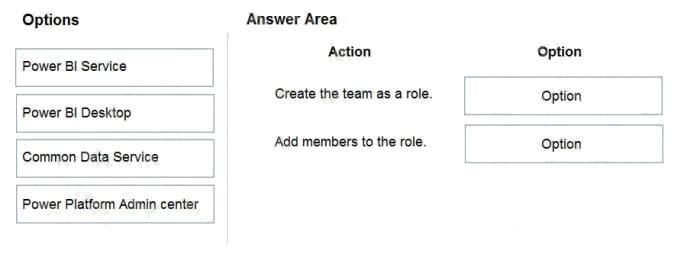
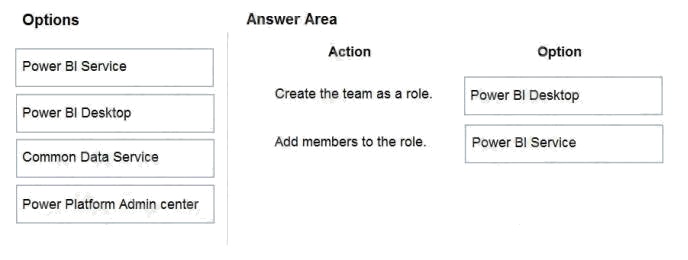
Explanation:
Box 1: Power BI Desktop
You can define roles and rules within Power BI Desktop. When you publish to Power BI, it also publishes the role definitions.
To define security roles, follow these steps.
1. Import data into your Power BI Desktop report, or configure a DirectQuery connection.
2. From the Modeling tab, select Manage Roles.
3. From the Manage roles window, select Create.
4. Etc.
Box 2: Power BI Service
After you save your report in Power BI Report Server, you manage security and add or remove members on the server.
1. In Power BI Desktop, save the report to Power BI Report Server. You need to use the version ofPower BI Desktop for
Power BI Report Server.
2. In Power BI Report Service, select the ellipsis () next to the report.
3. Select Manage > Row-level security.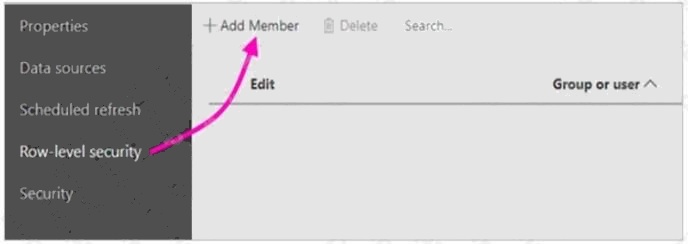
On the Row-level security page, you add members to a role you created in Power BI Desktop.
Reference:
https://docs.microsoft.com/en-us/power-bi/create-reports/desktop-rls
You are creating an app for a company.
You need to evaluate the default solution.
Which two behaviors should you expect from the default solution? Each correct answer presents a complete solution.
NOTE: Each correct selection is worth one point.
B D
Explanation:
The default solution in Power Apps is the Common Data Service Default Solution, which is associated with the Microsoft
Dataverse Default Publisher. The default publisher prefix will be randomly assigned for this publisher, for example it might be
cr8a3. This means that the name of every new item of metadata created in the default solution will have this prepended to
the names used to uniquely identify the items. If you create a new entity named Animal, the unique name used by Dataverse
will be cr8a3_animal. The same is true for any new fields (attributes), relationships, or option-set options. If you'll be
customizing this special solution, consider changing the publisher prefix.
Incorrect Answers:
A: You can only change the prefix of unmanaged solutions.
Reference:
https://docs.microsoft.com/en-us/power-platform/alm/use-solutions-for-your-customizations https://docs.microsoft.com/en-
us/powerapps/maker/data-platform/create-solution
You create a canvas app that connects to a Common Data Service database.
Users report that they do not see any data in the app.
You need to ensure that users can view data in the app.
What should you do?
C
Explanation:
Sharing access to the data in the Common Data Service. The users need permission to access the entities the app uses. To
grant them access, you will need to: 1. Create a security role
2. Assign users to the security role
Note: Common Data Service for Apps has a powerful enterprise grade security model that allows you to group users in
security roles and give those roles varying levels of access to entities that some of our most sophisticated business apps are
built on.
Reference:
https://powerapps.microsoft.com/en-us/blog/sharing-a-canvas-app-built-on-top-of-common-data-service/
You create a dashboard in Power BI. You share the dashboard with the sales team.
Sales team members report that they can see information for the entire company.
You need to ensure that the team is able to see only data for their team.
Where must you configure this restriction?
C
Explanation:
Restrict access to the dataset.
Note: Another way of setting access is through manage permission in the dashboard, report, or dataset. If you share a
dashboard, by default the report and the dataset will also be shared as read-only for users.
Reference:
https://radacad.com/dashboard-sharing-and-manage-permissions-in-power-bi-simple-but-useful
an instant flow for the sales log